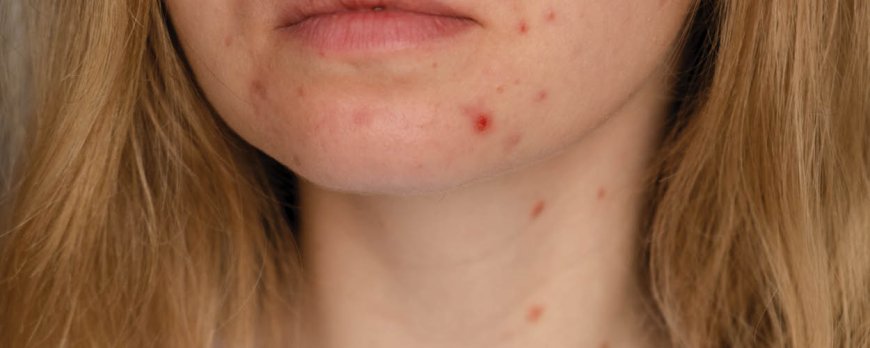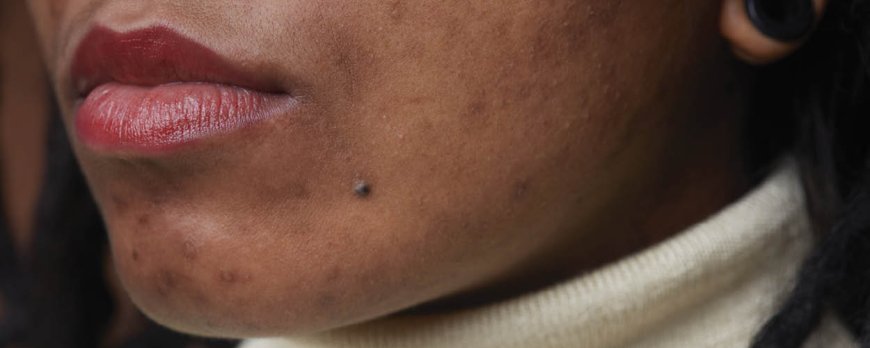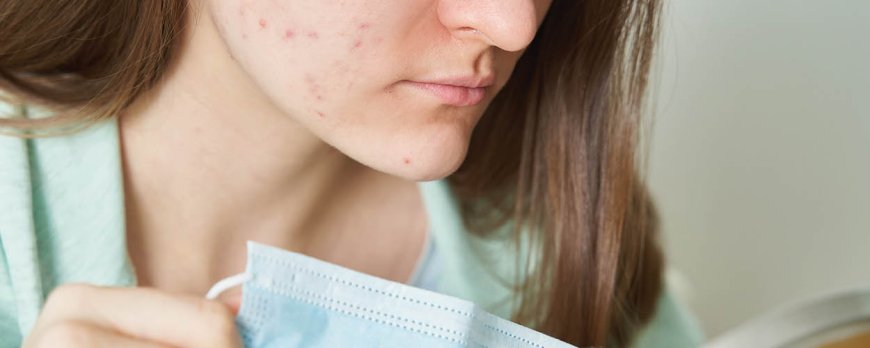Can bacterial acne go away on its own?
Explore whether bacterial acne can go away on its own. Comprehensive insights into managing and understanding bacterial skin issues.

Can Bacterial Acne Go Away on Its Own?
Bacterial acne, also known as acne vulgaris, is a common skin condition caused by the Propionibacterium acnes bacteria. This condition can lead to various skin issues such as inflammation, redness, and the formation of pimples, blackheads, and whiteheads. While bacterial acne can be treated with antibiotics, there is also a possibility for it to resolve on its own without any medical intervention. Understanding the factors that contribute to the development and duration of bacterial acne is crucial in managing and treating this skin issue.
Key Takeaways:
- Bacterial acne, caused by Propionibacterium acnes bacteria, is a common skin condition.
- It can lead to inflammation, redness, and the formation of pimples, blackheads, and whiteheads.
- Treatment with antibiotics is an option, but antibiotic overuse may lead to antibiotic resistance and disruptions in the microbiome.
- Narrow-spectrum antibiotics, like sarecycline, can specifically target the bacteria responsible for acne and reduce the risk of resistance.
- Zinc supplementation may also be beneficial in treating bacterial acne.
Understanding Bacterial Acne
Bacterial acne occurs when the Propionibacterium acnes bacteria multiply within the pores, leading to inflammation and the formation of pimples, whiteheads, blackheads, and cysts. This type of acne is a common skin condition that affects many individuals, particularly during adolescence. Understanding the causes and impact of bacterial acne is crucial for effective management and treatment.
When the P. acnes bacteria proliferate on the skin's surface, they can clog the hair follicles and sebaceous glands. This leads to the accumulation of oil, dead skin cells, and bacteria within the pores, triggering an immune response that results in the characteristic symptoms of bacterial acne. Hormonal changes, excess oil production, and certain genetic factors can contribute to the development of bacterial acne.
To effectively address bacterial acne, it is essential to adopt a comprehensive approach that combines proper skincare, lifestyle changes, and, when necessary, medical treatment. Dermatologists often recommend gentle cleansing of the affected areas, avoiding harsh scrubbing or abrasive products that can further irritate the skin. Additionally, implementing a consistent skincare routine that includes non-comedogenic products can help keep the pores clear and minimize bacterial growth.
In some cases, bacterial acne may resolve on its own within one to two weeks. However, for persistent or severe cases, medical intervention may be necessary. Dermatologists can prescribe topical or oral medications to target the bacteria, reduce inflammation, and promote skin healing. It is important to seek professional advice to determine the most suitable treatment options based on individual circumstances.

Duration of Bacterial Acne
The duration of bacterial acne can vary from person to person, but it generally lasts for several weeks or even months if left untreated. Bacterial acne, caused by the Propionibacterium acnes bacteria, can lead to persistent breakouts and inflammation if not properly managed.
It is important to note that the timeline for resolving bacterial acne can be influenced by various factors, including the severity of the condition, individual skin type, and underlying health conditions. Mild cases of bacterial acne may clear up within a few weeks, while more severe cases may require longer periods of treatment and management.
To effectively address bacterial acne, dermatologists often prescribe antibiotics that target the P. acnes bacteria. However, it is crucial for healthcare providers to practice antibiotic stewardship and ensure the appropriate use of antibiotics to minimize the risk of antibiotic resistance and disruptions in the skin's microbiome.
Antibiotic Resistance and Bacterial Acne
Overuse or misuse of antibiotics can contribute to the development of antibiotic resistance, making it harder to treat bacterial acne and other bacterial infections in the long run. This is why healthcare professionals are increasingly turning to narrow-spectrum antibiotics, such as sarecycline, for the treatment of bacterial acne. Sarecycline specifically targets the bacteria responsible for acne and has a lower likelihood of resistance than broad-spectrum antibiotics.
Alongside antibiotics, zinc supplementation has shown promise in managing bacterial acne. Zinc plays a role in modulating the immune system and reducing inflammation, which can help improve acne symptoms. However, it is essential to consult with a healthcare professional before starting any supplementation regimen.
While bacterial acne can be stubborn, it is important to remember that it can also resolve on its own in some cases. Maintaining a consistent skincare routine, practicing good hygiene, and implementing self-care strategies can help manage bacterial acne and promote overall skin health.
Treatment Options for Bacterial Acne
There are several effective treatment options available for bacterial acne, ranging from over-the-counter creams to prescription medications. Bacterial acne, caused by the Propionibacterium acnes bacteria, can be effectively managed with the right approach. Here are some treatment options to consider:
- Topical medications: Over-the-counter creams and gels containing ingredients like benzoyl peroxide, salicylic acid, or sulfur can help reduce acne-causing bacteria and unclog pores. These medications are usually applied directly to the affected areas and may be used once or twice daily. It's important to follow the instructions and gradually introduce these products to avoid skin irritation.
- Prescription antibiotics: For more severe cases of bacterial acne, dermatologists may prescribe oral antibiotics to help kill the bacteria and reduce inflammation. Commonly prescribed antibiotics include tetracycline, doxycycline, and minocycline. It's crucial to use antibiotics as directed and complete the full course of treatment to minimize the risk of antibiotic resistance.
For individuals concerned about antibiotic resistance, narrow-spectrum antibiotics like sarecycline can be a recommended option. Sarecycline specifically targets the bacteria responsible for acne and has a lower likelihood of resistance. Researchers have discovered that sarecycline binds to two active sites on the C. acnes ribosome, contributing to its effectiveness against bacterial acne.
Another potential treatment approach for bacterial acne is zinc supplementation. Zinc is known for its anti-inflammatory properties and its ability to regulate the production of sebum, the oily substance that can contribute to acne development. Some studies suggest that oral zinc supplements, together with other treatments, may help reduce acne severity. However, it's important to consult with a healthcare professional before starting any supplementation regimen.
While treatment options are available, it's worth noting that acne may go away on its own within one to two weeks in certain cases. However, it's always advisable to consult with a dermatologist for a personalized treatment plan based on the severity and type of acne experienced.
Antibiotics and Bacterial Acne
Antibiotics are commonly prescribed to treat bacterial acne as they can help reduce inflammation and kill the P. acnes bacteria. By targeting the bacteria responsible for acne, antibiotics can effectively clear up breakouts and improve the overall condition of the skin.
One type of antibiotic that has shown promise in treating bacterial acne is sarecycline. Research has found that sarecycline binds to two active sites on the C. acnes ribosome, which contributes to its effectiveness and lower likelihood of resistance. This narrow-spectrum antibiotic specifically targets the bacteria causing acne, reducing the risk of developing antibiotic resistance.
In addition to antibiotics, zinc supplementation has also been suggested as a potential treatment for bacterial acne. Zinc plays a crucial role in regulating the immune system and reducing inflammation, which can help alleviate acne symptoms. It is important to note that while zinc supplementation may be beneficial, it should be used as part of a comprehensive treatment plan and under the guidance of a healthcare professional.
Best Practices for Antibiotic Use
- When prescribed antibiotics for bacterial acne, it is essential to follow the dermatologist's instructions regarding dosage and duration of treatment. This practice helps ensure the antibiotics effectively target the bacteria causing the breakouts without promoting antibiotic resistance.
- It is crucial for dermatologists to practice antibiotic stewardship and prescribe antibiotics only when necessary. By avoiding unnecessary antibiotic use, the risk of antibiotic resistance and disruptions in the skin's microbiome can be reduced.
- Combining antibiotic therapy with other treatment options, such as topical medications and lifestyle changes, can provide a more comprehensive approach to managing bacterial acne.
While antibiotics can be effective in treating bacterial acne, it is important to consider the potential risks and weigh them against the benefits. Consulting with a dermatologist is essential to determine the most suitable treatment plan for individual cases.

Antibiotic Resistance and Bacterial Acne
While antibiotics can be effective in treating bacterial acne, their overuse can lead to antibiotic resistance, causing the bacteria to become less responsive to treatment. This resistance occurs when bacteria mutate and develop the ability to survive the effects of antibiotics. Over time, these resistant bacteria can multiply and spread, making it difficult to effectively treat bacterial acne.
Disruptions in the microbiome can also occur as a result of antibiotic overuse. The human body is home to a diverse community of bacteria, known as the microbiome, which plays a crucial role in maintaining overall health. Antibiotics not only target the acne-causing bacteria but can also disrupt the balance of beneficial bacteria in the microbiome. This disruption can lead to imbalances in the skin's ecosystem, making it more susceptible to bacterial acne and other skin issues.
To combat antibiotic resistance and minimize disruptions in the microbiome, dermatologists are increasingly turning to narrow-spectrum antibiotics for the treatment of bacterial acne. One such antibiotic is sarecycline, which specifically targets the Propionibacterium acnes bacteria responsible for acne. Researchers have found that sarecycline binds to two active sites on the C. acnes ribosome, contributing to its effectiveness and lower likelihood of resistance.
- Practice antibiotic stewardship to ensure the appropriate use of antibiotics for the right duration.
- Consider alternative treatments, such as topical medications, to reduce the reliance on antibiotics.
- Encourage a healthy skincare routine that includes gentle cleansing, exfoliation, and moisturization to maintain skin health.
- Explore natural remedies, such as tea tree oil or honey, which may have antimicrobial properties to help manage bacterial acne.
It's important for dermatologists and individuals alike to be mindful of antibiotic overuse and take steps to prevent antibiotic resistance. By understanding the risks associated with antibiotics, exploring alternative treatment options, and adopting a holistic approach to skincare, it is possible to effectively manage bacterial acne and maintain healthy skin.
Narrow-Spectrum Antibiotics for Bacterial Acne
Narrow-spectrum antibiotics, like sarecycline, are designed to specifically target the Propionibacterium acnes bacteria, reducing the likelihood of resistance development. Bacterial acne, caused by the P. acnes bacteria, can be effectively treated with antibiotics, but the overuse of antibiotics can lead to antibiotic resistance and disrupt the microbiome.
Researchers have found that sarecycline, a narrow-spectrum antibiotic, binds to two active sites on the C. acnes ribosome, which contributes to its effectiveness and lower likelihood of resistance. By specifically targeting the bacteria responsible for acne, sarecycline helps to minimize the risk of resistance development.
In addition to antibiotics, zinc supplementation has also shown potential benefits in managing bacterial acne. Dermatologists should practice antibiotic stewardship by prescribing the appropriate antibiotics for the right duration, taking into consideration the potential risks of antibiotic resistance and disruptions in the microbiome. However, it is important to note that in certain cases, acne may resolve on its own within one to two weeks.
When seeking treatment for bacterial acne, it is crucial to consult with a healthcare professional or dermatologist who can provide personalized recommendations based on the severity and specific needs of the individual. By considering options such as narrow-spectrum antibiotics like sarecycline and exploring additional treatments, individuals can effectively manage bacterial acne and reduce the likelihood of resistance development.
Zinc Supplementation for Bacterial Acne
Some studies suggest that zinc supplementation may help reduce acne symptoms, including bacterial acne. Zinc is an essential mineral that plays a crucial role in the immune system and skin health. It has been found to have anti-inflammatory and antibacterial properties, which can contribute to the management of acne.
When taken orally as a supplement, zinc can help regulate sebum production, reduce inflammation, and inhibit the growth of the bacteria associated with acne. Additionally, zinc can help promote wound healing and tissue repair, which can be beneficial for acne-prone skin.
While zinc supplementation may be helpful for some individuals with bacterial acne, it is important to note that the effectiveness can vary from person to person. It is recommended to consult with a dermatologist or healthcare professional before starting any supplementation regimen. They can assess your individual needs and determine the appropriate dosage and duration of zinc supplementation.
In addition to zinc supplementation, it is important to maintain a consistent skincare routine and practice good hygiene to manage bacterial acne. This may include cleansing the face twice daily with a gentle cleanser, avoiding harsh or irritating skincare products, and using non-comedogenic moisturizers. Regularly washing pillowcases and avoiding touching or picking at acne lesions can also help prevent further irritation and bacterial growth.

Self-Care and Lifestyle Changes for Bacterial Acne
Alongside medical treatments, adopting certain self-care practices and making lifestyle changes can help manage and prevent bacterial acne breakouts. Here are some tips to incorporate into your skincare routine:
- Keep your face clean: Wash your face twice a day with a gentle cleanser specifically formulated for acne-prone skin. Avoid scrubbing too harshly, as this can irritate the skin and worsen acne. Pat your face dry with a clean towel.
- Avoid touching your face: Touching your face with unwashed hands can transfer bacteria and oils, leading to acne breakouts. Try to resist the temptation to pick or squeeze pimples, as this can introduce more bacteria and potentially cause scarring.
- Use non-comedogenic products: Non-comedogenic skincare and cosmetic products are specially designed to avoid clogging pores. Look for products labeled "non-comedogenic" or "oil-free" to minimize the risk of acne flare-ups.
- Avoid excessive sun exposure: While some sun exposure can temporarily improve acne, excessive sun exposure can lead to skin damage and increase the risk of skin cancer. It's essential to protect your skin with sunscreen and wear protective clothing.
In addition to these self-care practices, certain lifestyle changes can also contribute to managing bacterial acne:
- Follow a healthy diet: Although there is no direct evidence linking diet to acne, a balanced and nutritious diet can promote overall skin health. Include plenty of fruits, vegetables, whole grains, and lean proteins in your meals.
- Manage stress levels: High levels of stress can trigger hormonal imbalances and worsen acne breakouts. Engage in stress-reducing activities like yoga, meditation, or regular exercise to help manage stress and promote a healthy mind and body.
- Avoid smoking and limit alcohol consumption: Smoking and excessive alcohol consumption can affect your skin's health and disrupt the balance of your skin's microbiome. Quitting smoking and reducing alcohol intake can have positive effects on your overall well-being and skin health.
Remember, everyone's skin is unique, and what works for one person may not work for another. It's crucial to consult with a dermatologist for personalized advice and treatment options tailored to your specific needs. With consistent self-care practices and lifestyle changes, you can effectively manage and prevent bacterial acne breakouts.
Hormonal Balance and Bacterial Acne
Hormonal imbalances, such as increased androgen levels, can contribute to the development of bacterial acne, particularly in teenagers and women. Androgens are hormones that stimulate the production of oil in the skin's sebaceous glands. When there is an excess of androgens, it can lead to an overproduction of sebum, which can clog pores and create an environment favorable for the growth of acne-causing bacteria.
To manage bacterial acne related to hormonal imbalances, dermatologists may recommend hormonal therapies. These treatments can help regulate hormone levels and reduce the severity of acne outbreaks. Common options include birth control pills, which contain estrogen and progestin to balance hormone levels, and anti-androgen medications that block the effects of androgens on the skin.
It's important to note that hormonal treatments may take time to show results and should be used under the guidance of a healthcare professional. Additionally, maintaining good skincare practices, such as gentle cleansing, exfoliation, and using non-comedogenic products, can help minimize breakouts and support overall skin health.
Conclusion
Bacterial acne can be effectively managed with a combination of medical treatments, self-care practices, lifestyle changes, and, in some cases, natural remedies. Antibiotics are commonly prescribed to treat bacterial acne caused by the Propionibacterium acnes bacteria. However, antibiotic overuse can lead to antibiotic resistance and disrupt the natural balance of the skin's microbiome.
One approach to mitigate the risk of resistance is the use of narrow-spectrum antibiotics like sarecycline. Research has shown that sarecycline binds to two active sites on the C. acnes ribosome, making it effective against the bacteria responsible for acne while reducing the likelihood of resistance. Additionally, zinc supplementation may provide benefits in treating bacterial acne.
It is crucial for dermatologists to practice antibiotic stewardship by prescribing the appropriate antibiotics for the right duration, considering the individual's condition and needs. In certain cases, acne may resolve on its own within one to two weeks without requiring medical intervention. However, seeking professional advice remains essential to prevent potential complications and scarring.
Aside from medical treatments, self-care practices and lifestyle changes play a significant role in managing bacterial acne. Maintaining a consistent skincare routine, including regular cleansing and using non-comedogenic products, can help reduce the likelihood of pore clogging and acne formation. Additionally, adopting a healthy lifestyle with a balanced diet, regular exercise, and stress management techniques may contribute to overall skin health.
In some instances, natural remedies may offer complementary support for managing bacterial acne. However, it is important to remember that individual responses to these remedies may vary, and consulting with a dermatologist is advisable to ensure safe and effective use.

FAQ
Can bacterial acne go away on its own?
In some cases, bacterial acne may resolve on its own within one to two weeks.
What is bacterial acne?
Bacterial acne is a skin condition caused by the Propionibacterium acnes bacteria.
How long does bacterial acne last?
The duration of bacterial acne can vary, but it typically lasts for several weeks to months.
What are the treatment options for bacterial acne?
Treatment options for bacterial acne include topical and oral medications, such as antibiotics and retinoids.
Can antibiotics help with bacterial acne?
Yes, antibiotics can be effective in treating bacterial acne by targeting and reducing the P. acnes bacteria.
What are the risks of antibiotic use for bacterial acne?
Antibiotic overuse can lead to antibiotic resistance and disruptions in the skin's microbiome.
Are there antibiotics that are less likely to cause resistance?
Yes, narrow-spectrum antibiotics, such as sarecycline, specifically target the bacteria responsible for acne and have a lower likelihood of resistance.
Can zinc supplementation help with bacterial acne?
Zinc supplementation may be beneficial in managing bacterial acne, as zinc plays a role in regulating sebum production and has antimicrobial properties.
What are some self-care tips for bacterial acne?
Taking good care of your skin, practicing proper hygiene, and avoiding excessive touching or picking can help manage bacterial acne.
Does hormonal balance affect bacterial acne?
Hormonal imbalances can contribute to the development of bacterial acne, particularly during puberty and hormonal fluctuations.
What are some natural remedies and skincare routines for bacterial acne?
Incorporating a consistent skincare routine, including gentle cleansing, exfoliation, and moisturizing, along with natural remedies like tea tree oil, may help manage bacterial acne.


































































































































